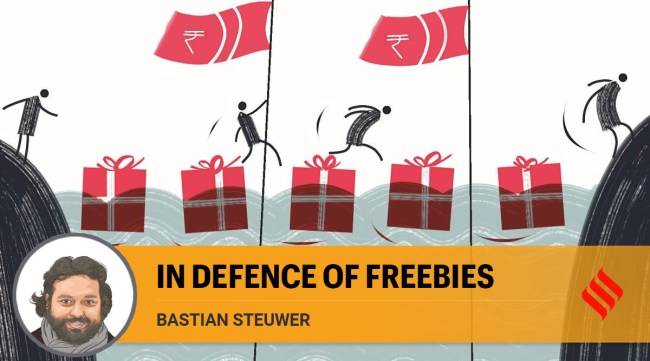Opinion In defence of freebies: What the current debate on ‘revdi culture’ tells us about our perception of India’s voters
The debate on freebies shows an implicit distrust of voters, especially poor voters. Leave it to voters to decide which promised policies are in their interest and furthering the common good
 Luckily, the days when people thought Indians could not be trusted with democracy are 75 years past us. The class bias in the concern about announcements of social welfare programmes is evident. (Illustration: C R Sasikumar)
Luckily, the days when people thought Indians could not be trusted with democracy are 75 years past us. The class bias in the concern about announcements of social welfare programmes is evident. (Illustration: C R Sasikumar) The pathology of the Indian public debate is how much it is biased towards the privileged. Given the levels of poverty and inequality in the country, one would hope for debates on how to improve the lives of those less fortunate in life. One could debate how to expand social security systems, how to invest in education and health, and how to generate more revenue. Instead, public debate focuses on so-called “freebies”. Instead of talking about how to expand social security, the debate focuses on the little support that is given. After the Supreme Court referred a petition challenging the announcement of “freebies” to a three-judge bench, now the Election Commission has proposed a change in the Model Code of Conduct requiring an explanation for how promises would be financed.
The Supreme Court is ostensibly aware of the need for social welfare programmes. Such programmes further the Directive Principles of State Policy under Part IV of the Constitution. Article 36 of the Constitution encourages the state to secure a just social order. Article 39 says that the state shall make efforts to reduce the concentration of wealth and promote the common good. But even without the Directive Principles, social welfare for the poor is a basic demand of justice, humanity, and compassion. In the hearings before the Supreme Court, the Court was searching for a distinction between social welfare on the one side and “irrational freebies” on the other side. Whichever way we look at the issue no principled distinction can be made.
Let us start with the distinction, espoused by some progressives, that investment in public goods is social welfare and that the distribution of private consumption goods is a freebie. This approach classifies intangible entitlements for everyone, like public health care and education, as social welfare. But on this understanding, the Public Distribution System (PDS) would fall on the freebie side. People receive a consumption good (food) rather than an intangible entitlement. No one should seriously doubt the ability of the state to tackle endemic hunger through the PDS.
Another way to distinguish is to distinguish basic needs from luxury consumption goods. Yet where does one draw the line? Both the petition in the Supreme Court and Advocate General Tushar Mehta spoke out against free water and free electricity. But access to clean water and electricity are clearly basic needs. Even more contentious examples like free scooters or phones can be interpreted as basic since, after all, they serve needs of mobility and communication. Furthermore, even goods that serve non-basic needs can have highly positive effects. If free scooters lead to higher enrolment in higher education, then this can be a desirable policy outcome.
What about cash distribution then? There is no good reason to distinguish between in-kind distribution and cash distribution either. At times, distributing cash can be more efficient. Jean Drèze and Amartya Sen have long argued that in the case of famines it is easier to prevent famines by raising incomes than by distributing food in-kind. Cash transfers also have other advantages. For some, cash transfers avoid paternalism and give greater agency to recipients. Lastly, a developed welfare state relies on cash transfers in the form of unemployment insurance and India already uses cash transfers for old age pensions.
All of this leads to one conclusion. There is no principled distinction between social welfare and freebies. Of course, some election promises are silly, inefficient, or a waste of money. The real distinction is between good policies and bad policies. But this decision must be made on a case-by-case basis. We already have a system in place for this — elections. Voters have the authority to decide which promised policies they find both in their own interest and as furthering the common good.
The debate on “freebies” shows an implicit distrust of voters, especially poor voters as if they could not be trusted to make responsible decisions. Luckily, the days when people thought Indians could not be trusted with democracy are 75 years past us. The class bias in the concern about announcements of social welfare programmes is evident. No court case is filed about announcements of policies that benefit affluent classes. No concern is raised about a government promising tax reductions for the rich even as they have the same fiscal implication.
If one believes a policy to be an “irrational freebie”, then one should make a case for it in democratic debate. But one should not seek to limit the options for democratic contestation by removing policy options from the table.
The Election Commission’s proposal to explain funding for campaign promises is not helpful in this regard. For example, increasing spending for the PDS not only costs money but also has the potential to increase the productivity of better-fed workers. This will help generate revenue in turn. But no one can accurately predict the actual costs and benefits. Unreliable guesstimates do not serve the purpose of fair elections.
A key argument against “freebies” pertains to fiscal responsibility concerns. Budgets are, after all, limited. But what is remarkable is that the focus of the debate is entirely on cutting budgetary expenditure on policies that affect the poor. One can balance the budget similarly by spending, or rather, wasting less money on white elephant projects.
The other side of any budget is revenue generation. Only a small fraction of Indians pays any income tax. Part of the problem is tax evasion. But it is also true that the vast majority of households earn too little to pay income tax. Income below Rs 5 lakh is entirely exempted from any income tax. This threshold is regularly increased. Increases are paradoxically often hailed in the business media as relief for the common man.
In fact, a recent report by the Economic Advisory Council estimates that earning Rs 20,000 a month puts you in the top 10 per cent of all income earners. All of this does not even take into consideration that India has no wealth tax or inheritance tax. If one is concerned about balancing the budget, would it not make more sense to start taxing the affluent instead of focusing on welfare spending for those less fortunate?
The author is a political philosopher working at Ashoka University. Views are personal and do not reflect those of Ashoka University






